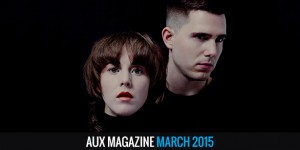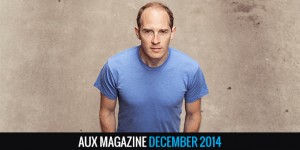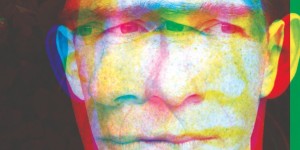Q & A: Miguel waves the flag for real R&B
by Chayne Japal
February 5, 2013
After years with commercially driven, uncharacteristically soulless music as its calling card, contemporary R&B is in the middle of a long-overdue retroaction. Los Angeles crooner Miguel is a key component in the revival, helping to restore some respect and relevance to the tender genre. 2012 saw the release of three free EPs, followed by a sophomore LP, Kaleidoscope Dream, that put an alternative spin on his music, a bold move considering that he’d previously had a taste of success using a slightly more common approach. His gamble paid off—an influx of new fans and pleased critics confirmed how important Miguel is to the repairing of R&B. But while his music and career remain so inextricably linked to it, how important is R&B to the individual?
AUX: The first thing I have to be clear on: seeing that you’ve become such an eclectic musician, are you cool with the R&B tag?
Miguel: Absolutely. I feel like I wave the flag for what R&B really is. Proudly. I’m not talking about what R&B has become. I think R&B has become a stereotype more than a genre. See, when you say genre you have to keep in mind that the real genre also has subgenres and they’re made up of sensibilities, but not expectations. I think that what modern R&B has become is stereotyped in that way because of that expectation. The expectation to be sexy, romantic, for the bedroom, or for the ladies. To be all these little buzzwords that are attached to R&B. So it’s become a caricature of itself as opposed to a real description of the music, which is really soulful. It’s supposed to be soulful. That’s what R&B is, it’s about the soul. I’ll wave the flag for soul music: the real R&B.
How did you realize that?
I think more than anything it’s just from listening to those artists that I love, bands that were experimental and took chances but were still soulful. Let’s look at Funkadelic, Hall & Oates, Jimi Hendrix, The Brothers Johnson, Chicago, D’Angelo, Marvin Gaye, and Stevie Wonder. None of these artists sound anything like each other. They were all considered soulful. They were all very soulful artists. So, I feel like we’ve forgotten that it’s OK to be different from each other but still share some sensibilities. That’s what real R&B was about. I think my statement for that perspective, the kind of artist that I want to be, really starts with Kaleidoscope Dream. Not that the music on my debut album wasn’t good or unique, but I think I drove the point home for what should be allowed and what should be expected of R&B.
What happened between albums to lead you down this path?
It’s just time and growth. I did most of the work on the first album [All I Want Is You] in 2006/2007. Because of the amount of growing and the natural evolving that happens in that time, it just made that first album feel dated by the time we released it. You can hear it in my voice when I talk about R&B, I’m very passionate about what I believe R&B really is and I want to remind people of that. I want them to expect more. A lot of R&B that we hear today, especially commercial R&B, is interchangeable. You could play one R&B song next to another and sometimes you can’t even tell the difference. So, I saw that and I got a little frustrated with it. I didn’t initially set out to do this but eventually I realized that I just wanted to breakdown some of the stereotypes that are out there.
And you feel like you’ve been able to do some of that with Kaleidoscope Dream.
That’s why I love this album. It’s a statement to the kind of artist I intend on becoming. It showcases the kind of risks that I wanted to take. I’m proud of that. All of my favourite artists took risks and made music that, at the time, in context, was very different.
You’ve made such a big leap with this record. Sorry to put this out there like this but I think it has to be a bit daunting to think about following this up. Do you have any sort of plan for where you’re going to go from here?
I have a lot of learning to do about myself, about artistry, and about what I appreciate from my favourite artists even more. I have to get back on the road and just grow as a human being. Those experiences that you amass with time, there’s no real replacing that. What I can say is that the next album will be different from this. I think the goal, the principles, the sensibilities, the choices will always be unique to who I am and will always be familiar but I feel a responsibility every time to somehow educate myself and hopefully, in turn educate my audience. With that in mind, it’s not scary at all because I know that by then I would have learned. Even now, I’ve already learned from this process. The kind of artist that I want to be is one that is forever evolving like my favourite artists were.
Can you tell me about how hip-hop has influenced you as an artist and how it’s affected your career?
Early on, it influenced my delivery and cadence. For a while, there was a cool moment when R&B was still soulful but dabbling in the cadence and delivery of hip-hop while adding melody. It eventually became more and more watered down though. So more than that, I’ve been influenced by hip-hop’s marketing and how it’s adapted. I think we’ve learned so much about music business through hip-hop. With how so much has changed since the internet, I think hip-hop has adapted the best by keeping up with the pace and attention span of audiences.
So that’s what the Art Dealer Chic mixtapes were about earlier this year?
Absolutely. The Art Dealer Chic series is my adaptation of that because I have to still stay true to my principles. While hip-hop keeps up with the demand for content, in some ways, it detracts from the value of music. If you can just give me it for free all the time on blogs, why would I go pay for it? But I also had to keep in mind that we’re so bombarded with so much information and content that we can’t keep up. I go to my favourite blogs to discover new music and most times I’d check out one or two songs from a particular artist. If it’s a full mixtape, there’s no way I’d listen to the whole thing in one sitting. I just can’t. I have other things to do. So, how do I keep up with the demand but at the same time, not compromise my principles and my value of music> That’s how I came up with the concept: I’ll do three songs a month, shoot a video for one of them, and put them out as mini-EPs, and I’ll do it for three months. It was an experiment to see if I can stay connected with an audience and start to garner some expectation and attention. Just to keep up, to stay in people’s minds a little bit, like, “I’m still here, guys.”
Looking back, how much will 2012 mean to you?
I feel like this year will be the cornerstone to my career. In retrospect, it’s one of the stronger building blocks so far. I have a lot to work on. I have a lot to earn and a lot to accomplish. I have more music to put out. But this year has been such a pleasure because I was able to be introduced to new audiences and to be embraced by them. It’s been really special. We’re going to end it strong with this tour. I can’t wait, man. It’s really encouraging.

This article originally appeared in the December 2012 Issue of AUX Magazine.
Download and subscribe for free in the app store.
Tags: Music, Featured, Interviews, AUX Magazine, Miguel





